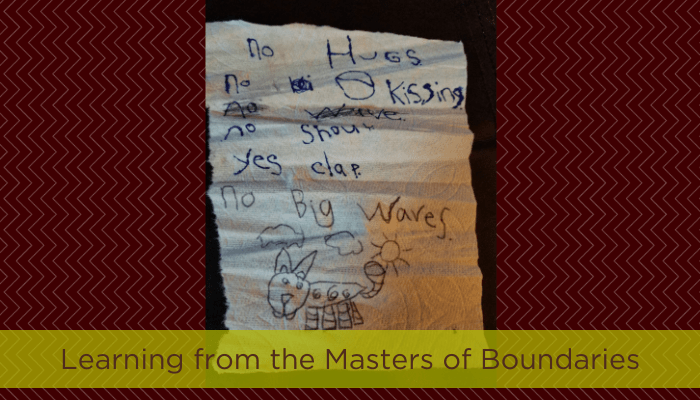I have one teenager and one tweenager, so I am no stranger to my kids setting boundaries. They tell me to leave all the time or to walk ten feet behind them when we are at the Brat Fest or to not ask any questions when I meet their new friend for the first time. Apparently, moms are still as embarrassing as they were when I was 13.
But the other day my team member Jill told me a story that really helped me appreciate just how good kids are at setting boundaries. It got me wondering when and why we stop.
No waving, please
Jill was going to watch a friend’s 10-year-old son Ben sing in his choir concert. When she got there, Ben already had quite the cheering section, including his immediate family, his grandparents, and now Jill. As soon as she sat down, his little sister Violet said, “Ben has rules.”
And so he did.
A whole list of rules, which he had dictated to Violet and she had carefully written on a paper towel, outlining exactly what was and wasn’t allowed. Turns out there was not any cheering allowed for this cheering section!
Here are the rules (as seen on the original paper towel above):
- No hugs
- No kissing
- No shout
- Yes clap
- No big waves
You got all that? As tempted as the adults were to shout his name and wave with excitement, they obeyed all his rules and put their energy into clapping as enthusiastically as possible.
Tell me what you want
Little kids boss us around all the time telling us what they want. Mine! Don’t touch! Get out of my room! Leave me alone!
And while they could stand to work on their delivery, it is kind of refreshing to know exactly where you stand. So why do we stop doing that? If someone was coming to one of my events, I can’t imagine telling them exactly how they were allowed to behave.
Although rules about when and how to clap might not work, what about setting and communicating acceptable boundaries? For example, could you let people know if it is okay to interrupt you to ask questions, or if you prefer they wait until the end? If you do tell them, they will probably do what you ask and everyone will feel fine.
But if you don’t tell them, then they will do what they want, and there is a 50% chance you will feel annoyed.
Grown-ups don’t get a Violet
Ben was lucky to have his sister there in the audience, ready to share all of his rules. But as adults, we’re probably going to have to set our own boundaries. But I am here to encourage you to be brave! Tell people what you want, and you can avoid a lot of potential miscommunication, resentment, or embarrassment (what with the shouts and all).
You can be nice about it, and hopefully people will respect where you draw the line. It is important that boundaries are clear, and it’s okay to remind people if they aren’t respecting yours.
The flip side of this is that you have to respect other people’s boundaries as well! Ben’s family and friends were all well behaved, and they listened to what he asked. This will give him confidence that he can get support from his family and not walk away totally humiliated.
You can just watch
The morning after the concert, Jill was walking Ben to school, and he told her which intersection he was allowed to walk her to. And then? “And then you can watch me,” he told her. And so she walked him to the appointed corner, and watched him walk away, and we all learned a thing or two about boundaries from a 10 year old.


